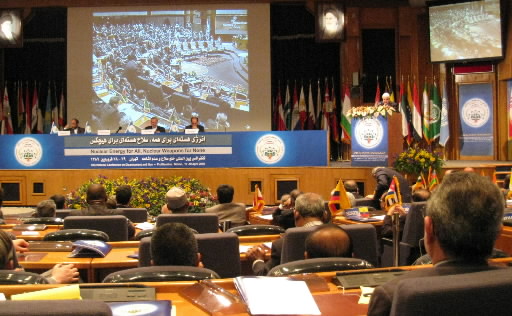Nuclear Weapons Can Be Eliminated: Chapter 12, Part 5
Jun. 23, 2010
Chapter 12: Opening the Door to Abolition
Part 5: Covering the world with a non-nuclear umbrella
by the "Nuclear Weapons Can Be Eliminated" Reporting Team
Like a nuclear weapons convention, nuclear-weapon-free-zone treaties are considered an effective step on the road toward nuclear abolition. By prohibiting the development, possession, and transit of nuclear weapons among the members of a nuclear-free zone, the treaty is intended to increase the security of that zone and, at the same time, place restrictions on the actions of nuclear weapon states.
Currently, there are five such treaties in the world, including one covering 54 nations in Africa, along with the Western Sahara region, and another involving five countries in Central Asia, both of which came into effect in 2009. When Mongolia, whose unilateral declaration of non-nuclear status has been approved by the United Nations, is included, a total of 119 nations and regions, amounting to more than 60% of the 192 U.N. member countries, are under the "non-nuclear umbrella."
Challenges to be solved include North Korea
In addition, efforts are being made by some nations, politicians, and NGOs to realize treaties for a nuclear-free zone in the Middle East and in Northeast Asia. Since a de facto nuclear weapon state and a self-declared nuclear power are located in these regions -- Israel and North Korea, respectively -- the denuclearization of these two states is the highest hurdle for making the regions free of nuclear weapons.
The 2010 Nuclear Non-proliferation (NPT) Review Conference closed on May 28. The final document, which was adopted with difficulty at the conference, condemns North Korea for its nuclear tests and calls on that nation to give up its nuclear weapons. With regard to the Middle East, the language "will convene a Conference in 2012, to be attended by all States of the Middle East, on the establishment of a Middle East zone free of nuclear weapons " was included in the document.
Though Israel, which is a non-signatory to the NPT, immediately argued that it has no obligation to follow the decisions articulated in the final document, the patient efforts of such nations as Egypt led to this concrete language concerning the Middle East.
In the Middle East, Iraq once made use of poison gas, a chemical weapon, which is thought of as a weapon for poor states. Iran is now suspected of seeking to develop nuclear weapons. It is an undeniable fact that the root cause of the instability in that region can be traced to Israel's possession of nuclear weapons. At an international conference held in Tehran this past April, Israel faced a surge of criticism, particularly from the Arab nations.
"Negative security assurance" should come first
Meanwhile, the regions covered by the non-nuclear umbrella are separately seeking an additional measure to limit the actions of the nuclear weapon states, namely a "negative security assurance" in which the nuclear powers would pledge not to stage a nuclear attack on their nuclear-free zones. The nuclear-free zone covering 33 nations of Latin America and the Caribbean has been the first to gain this assurance.
For Northeast Asia, it is said that realizing the "negative security assurance" is prerequisite to forming a nuclear-free zone. This stems from the idea of providing impetus to reverse North Korea's nuclear program, an effort bearing little fruit thus far, by establishing an environment in which no nuclear attacks would be made from outside into the nuclear-free zone.
Today, nine nations, including Israel and North Korea, hold nuclear weapons while the non-nuclear weapon states, which make up the vast majority of the world, are expanding the earth's nuclear-free zones. This fact itself is a clear message of anti-nuclear sentiment from the majority of the world's nations. Given such momentum, shouldn't the A-bombed nation of Japan step forward to spearhead efforts to denuclearize Northeast Asia?
(Originally published on June 18, 2010)








